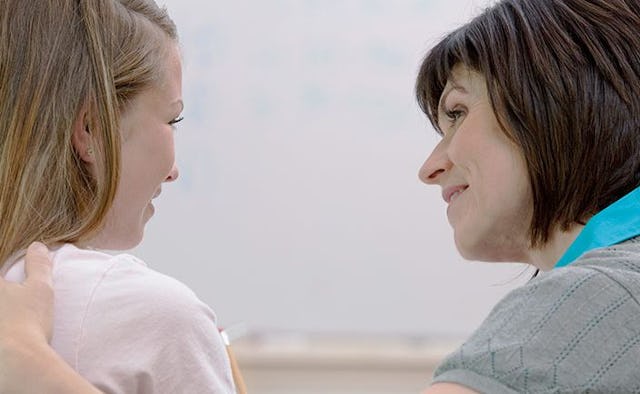An Open Letter to the Parents of the Bully at My Kid's School

To the Parents of the Kid Who Bullied My Kid,
I don’t know what it’s like to be in your shoes, but something tells me it’s not very different than being in mine. I’m pretty certain we both love our kids fiercely, that we both wish we knew what was going on inside their heads a lot more than we do, that we are too often afraid we are saying or doing things wrong as we stumble through this new territory of middle school and social media and hormones.
When I first heard about the things your kid said and did to my kid, my stomach twisted in a pretty tight knot. I’ll bet yours did, too. I suspect we both went through the same progression of feelings: from anger to protectiveness and, finally, sadness. When I saw you in the hallway outside the school counselor’s office after we all found out what was going on, for a moment I wished that you all would just disappear. I’m thinking you felt the same way.
Ultimately, I was concerned with making sure that my daughter felt safe walking the halls at school and sitting down to lunch with her friends; that she not worry about being attacked. I imagine you wanted those same things for your daughter. The pain and devastation on my daughter’s face as she talked about how she was treated broke my heart; I suspect your heart was no less broken when you heard all the messy details. In the days that followed, I took care to remind both of my kids that I always want them to feel free to come to me when they’re hurting or feel threatened. I expect you want your daughter to know you are always there for her, too.
It may seem as though we are on opposite sides, but we aren’t. While it is important for me to teach my daughter that she is in no way responsible for the way she was treated and that your daughter must be held accountable for her actions, I can’t let that be the whole story. I have to acknowledge that your kid wouldn’t have acted the way she did if she hadn’t been hurting. I have to remember that ultimately we are on the same side, you and I, the side of parenthood. The side that drives us to protect our children and love them no matter what, the side that wishes we had more answers than questions, the side that wants to make it all better every time even though we know we can’t.
The truth is, I can support my daughter, help her heal, and encourage her to cultivate healthy relationships with strong boundaries, and so can you. It is not betraying my daughter or minimizing her experience to acknowledge that your daughter deserves the same support and love and respect my daughter does. In the end, I hope that the lessons our girls learn from this are powerful ones about making mistakes and hurting others when we feel hurt. I hope they think about the notion of forgiveness and what it means to have compassion for someone else without excusing bad behavior. I hope they feel empowered to speak up for themselves in positive ways and to seek out people who make them feel good about who they are.
As painful as this experience was, I am grateful for the opportunity to teach my daughters some important lessons about relationships while they are still willing to come to me and ask. I hope some good has come out of this for you and your daughter, too. As parents, we’re all in this together, and since we’re raising the next generation of adults, it’s in everyone’s best interest to find our collective strength and raise our kids with an abundance of love and acceptance. While our daughters will probably never be friends again, I hope they will one day be able to acknowledge their shared humanity. We are not so different, after all.
This article was originally published on